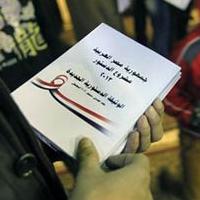
More workers and youth will conclude working class must raise own independent interests
To no-one’s surprise, 98% of voters said ‘Yes’ to the new constitution in last week’s referendum in Egypt. Almost three years since the beginning of the massive movement of the Egyptian people that led to the overthrow of long-standing dictator, Hosni Mubarak, many yearn for some stability. But the low 38.5% turnout shows large numbers of Egyptians have no enthusiasm for, and many actively oppose, the new constitution.
The Muslim Brotherhood (MB) boycotted the vote. In less industrialised areas, where the MB’s support is strongest, turnout was closer to 20%. But among those aged under 30 – the most active forces of the 2011 revolution – turnout was unofficially reported as 19%.
Senior armed forces officers rode on the back of the massive protests against MB President Morsi on June 30th 2013 to install a military-backed government led by General Abdel Fattah el-Sisi, posing as defenders of the Egyptian people from a MB takeover. The lack of independent working class organisation in the demonstrations, either through trade unions or a mass working class party, allowed the officers to fill the vacuum caused by the MB government collapse. After the massive pressure of millions of workers on the street, the officers announced measures, such as increasing the minimum wage for public sector workers (but not private sector).
Now these officers are trying to consolidate their position. The new constitution, written by an unelected committee without representation from the independent trade unions, allows the armed forces to continue hiding its huge business interests. It will decide who the defence minister is – not an elected Parliament. Military trials for civilians, so hated under Mubarak, continue. Although strikes and sit-ins are defined as rights, the constitution allows the government to regulate how these ‘rights’ will be used.
Tough new laws regulate the right to protest, requiring protest organisers to get police permission, giving 24-hours’ notice, details of start and finish times, route and names of organisers. Demonstrators who have defied this new law have been beaten up and sexually harassed while in detention. Journalists thought to be sympathetic to the MB have also been arrested.
Persecution of youth and left activists
While the round-up of MB leaders as “terrorists” has been widely supported, the police and security forces have also used their regained powers to arrest young and left-wing political activists. There have been almost daily protests in universities, many by students supporting the MB but also by liberal and socialist students. Security forces have stormed on to university campuses, as well as attacking protests and activists outside. Bit by bit, Mubarak’s repressive regime is being reconstructed.
In April 2013, weeks before the huge demonstrations forced Morsi out, there were 448 workers’ protests, including strikes, blockades and occupations. In December there were only 11, although this included an important strike by 5000 workers at Egyptian Iron and Steel Company (Figures from Egyptian Centre for Social and Economic Rights).
The economic situation remains dire, meaning more attacks to come on workers’ pay and conditions, and subsidised cooking gas and foods. The ruling class is desperate to have a strong government that can successfully implement these attacks.
But different sections of the ruling class have their own interests. Senior officers control industries owned by the armed forces. Under Morsi, they were challenged by the wealthy businessmen of the MB. Another section of big business is not aligned to the military or MB, but they have thrown their weight behind Sisi to become the new president. A presidential election is likely soon, with Sisi widely expected to declare his candidacy on January 25th, the anniversary of the start of the uprising against Mubarak.
Sisi hopes to get elected with a similarly convincing majority to the referendum, boosting his authority to carry out the cuts and repressive measures Egyptian capitalism needs to survive. But workers and the youth have seen off Mubarak and Morsi and will not easily give up their rights to organise and fight for their interests.
Drawing on the lessons of the past three years, increasing numbers of revolutionary workers and youth will conclude that the working class must raise its own independent interests and not be sucked into support for one or other wing of the capitalist class. Workers need to build their own organisations, including a mass party with a programme of democratic socialist change that could unite all their struggles into an unstoppable movement for a government of workers and the poor.


Be the first to comment